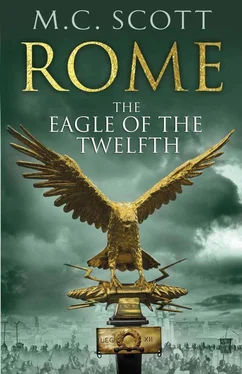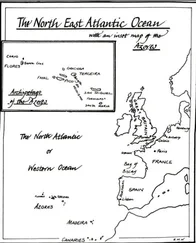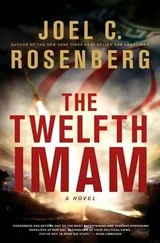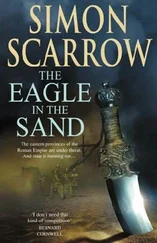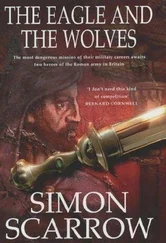M. Scott - The Eagle of the Twelfth
Здесь есть возможность читать онлайн «M. Scott - The Eagle of the Twelfth» весь текст электронной книги совершенно бесплатно (целиком полную версию без сокращений). В некоторых случаях можно слушать аудио, скачать через торрент в формате fb2 и присутствует краткое содержание. Жанр: Исторические приключения, на английском языке. Описание произведения, (предисловие) а так же отзывы посетителей доступны на портале библиотеки ЛибКат.
- Название:The Eagle of the Twelfth
- Автор:
- Жанр:
- Год:неизвестен
- ISBN:нет данных
- Рейтинг книги:5 / 5. Голосов: 1
-
Избранное:Добавить в избранное
- Отзывы:
-
Ваша оценка:
- 100
- 1
- 2
- 3
- 4
- 5
The Eagle of the Twelfth: краткое содержание, описание и аннотация
Предлагаем к чтению аннотацию, описание, краткое содержание или предисловие (зависит от того, что написал сам автор книги «The Eagle of the Twelfth»). Если вы не нашли необходимую информацию о книге — напишите в комментариях, мы постараемся отыскать её.
The Eagle of the Twelfth — читать онлайн бесплатно полную книгу (весь текст) целиком
Ниже представлен текст книги, разбитый по страницам. Система сохранения места последней прочитанной страницы, позволяет с удобством читать онлайн бесплатно книгу «The Eagle of the Twelfth», без необходимости каждый раз заново искать на чём Вы остановились. Поставьте закладку, и сможете в любой момент перейти на страницу, на которой закончили чтение.
Интервал:
Закладка:
I found myself back to back with Horgias, with the Eagle high above.
‘The bow!’ Tears shouted in my ear. ‘Use it now while there’s still time. We’ll keep you safe.’
I was already unslinging it, feeling for the arrows in the quiver at my belt. Ten; I had thought seven remained, but there were ten. I nocked and turned and scanned the horizon for the king on the white Berber horse.
And saw it, so close; a milk-white mare that my father would have given his soul to see even in a paddock of an evening. Here, in battle, it was a mount of the gods.
I was close enough to see the width and depth of its eyes, to see the broad, flat brow and the ears pricked small, beloved of Xenophon. I saw the red flare of its inner nostril, the soft moleskin velvet of its milk-white muzzle. I saw the prick of whiskers on its face, black on white.
And I saw the face of the man who rode it, who fought from horseback with long, swinging strokes of a cavalrysword. A man whose black hair flowed like a mane from under his gilded helmet, whose eyes were alert, darting back and forth, holding the edge of the battle that we might not break to our south.
And I saw his chest, and the mail that was on it, and remembered Pantera in a forest, who had killed another king. The bow I held now was better than his had been then; the arrows were longer, and the tips designed only for this one task.
I drew, sighted and loosed.
The brief bliss of honey and the hum of droning bees ended in the whistle-crack of a direct hit.
In the battle’s fury, very few on the enemy side noticed at first that their king had been struck. He himself sat a moment, staring in weary surprise at the arrow that grew from his breast, much as the treacherous son of the King of Kings had done all those years ago in Hyrcania. But this king fell slowly, not being strapped into the saddle as the usurper had been.
A ragged cheer spilled from half a hundred throats; all of us that were left.
From the Hebrew side came a single cry of anguish, high-pitched, like a woman’s: ‘Menachem! My lord king is struck!’
And then the enemy did notice who had fallen and it was as if the force of their fighting slammed headlong into solid stone.
Never have I seen the flow of battle stemmed so completely. In one moment they were assaulting us on all sides and we were close to overwhelmed, and in the next we had room to move, to swing our sword arms, to reach out and kill men whose attention was all turned away from us, towards their stricken lord.
‘He lives!’ The voice cried in Greek, from a Roman throat, but the men that called it afterwards in Aramaic were Hebrew.
‘A line!’ I dropped the bow and raised my sword. Stepping forward, I shouted left and right, hoarse from the screams of combat. ‘Make a line on the Eagle! Advance!’
Battles can turn on a single moment and we, who had seen enough of them turn against us in the past, felt the gods lay this one open for us to turn it our way.
I felt Tears to my right, Horgias on my left; I think Taurus was still there as his shield-man. With our shields locked, we stepped forward and forward, building speed and power with each stride. I was dizzy with pride. I saw Hebrew men half turn to me and slew them without care, without pause. I sang, I think, but cannot remember what.
The enemy parted before me like corn before a storm. I looked down the long tunnel of space they made and there was a man lying at the end of it, with the stump of a broken arrow rising up from his chest.
A single man dressed in perfect white knelt and cradled his head, except when I looked again it seemed the white-clad aide was a woman: nothing was impossible now, not even that a woman should be on a battlefield.
She raised her eyes and looked at me and I saw darkness and heard the songs of all the dead and knew that he had gone, this self-styled king, and that grief for such a death made men weak.
I raised my shield and drove forward my sword and thought that if we could get to him we could kill also his successors, because the heirs always gather round the death-place of their fallen lord.
And so our line became a wedge, that fabled machine of Alexander that can cleave a battlefield in two if the lead man has only the courage of his charge. I was the tip of the arrow, the nose of the boar as it hurtles at its victim. I had all the courage in the legions.
‘ For the Twelfth! ’
I charged, screaming, drawing the wedge with me. Together, we split the enemy asunder.
Men fell over themselves to get out of our way until somewhere near the king a man stood who had been kneeling and in a voice that had commanded battlefields shouted in Greek, ‘Stop them! Mergus! Estaph! Block that wedge! ’
The voice sank into my lungs, my loins, my heart, unsettling all of them. But it did not stop my charge.
I was five paces from the king… four… two… my whole weight behind my shield, bowling fast as a horse, and then Stopped.
Stopped on the rock of the giant Parthian who had picked up a shield and punched it at mine. I ran into it as into the face of a cliff.
The full weight of my charge pounded into him and he did not so much as shudder. I felt men crowd in behind me, Tears at my right shoulder, Horgias at my left, and even the three of us, with others behind, could not push him over.
I abandoned the effort, shouted instead, ‘Shield ring on the Eagle!’ and in three beats Horgias was enfolded within our shields and we stood again, bare yards from the fallen king, while a Latin voice shouting in Hebrew and Aramaic drew order out of the enemy’s chaos.
Looking past the Parthian giant’s flank, I watched a small group of men lift the stricken king and bear him from the fray. I saw the Roman with the red shoulder cloak pause in salute, then turn and, still shouting orders, throw himself into combat.
We held our ground but our advantage was gone and they came at us savage with a grief-rage that we all knew too well, but could not raise in ourselves, for we were spent by then, fit only to stand and die.
We were two dozen, and then a dozen, and then eight andthen four, me and Tears, Horgias and Taurus, back to back with the Eagle above us and dead men crowding our feet.
I felt Taurus go down and would have turned to help Horgias, but Tears was under pressure from a small, wiry Roman with legion marks on his arms and a look of such impossible anguish on his face that I thought he might die of it, there, in front of us.
Instead, he assaulted Tears with a savagery that made the whole battle seem like the pattering of fools; he struck his shield against Tears’ sword hand, batting it down, cut with his gladius under Tears’ own shield, then feinted over the top and even as I was turning, trying to get my blade between them, stabbed in and down and through and suddenly my face was awash with Tears’ blood and the sounds of his dying and I would have dropped my blade to catch him but that Horgias screamed, ‘ Demalion! Look out!’ and I swear it was the sun’s flame on the Eagle that made me spin to my right and catch the blow that came for my head, and twist it away and stab through to pierce the eye of the one who had just tried to kill me. He died, screaming, clutching at his face. I pulled my gladius free and stepped back.
And now we were only two. Horgias and I were left alone, the last to die, and we did not have to say aloud that we must die together. I caught his eye or he caught mine and we knew it our last look, and cherished it. A last breath, a last sight of the Eagle, of all that we cared for, and in that breath’s end, together we raised our blades and hurled ourselves at ‘ Demalion? ’
The sword that struck for my chest jerked away.
A half-remembered face stared at me, blinking, and that inescapably Roman voice, the one that even now commanded the battlefield, said, in astonishment, ‘Demalion of Macedon?’ And then, ‘Mergus, leave him! Estaph, stop! Take them alive! It’s over.’
Читать дальшеИнтервал:
Закладка:
Похожие книги на «The Eagle of the Twelfth»
Представляем Вашему вниманию похожие книги на «The Eagle of the Twelfth» списком для выбора. Мы отобрали схожую по названию и смыслу литературу в надежде предоставить читателям больше вариантов отыскать новые, интересные, ещё непрочитанные произведения.
Обсуждение, отзывы о книге «The Eagle of the Twelfth» и просто собственные мнения читателей. Оставьте ваши комментарии, напишите, что Вы думаете о произведении, его смысле или главных героях. Укажите что конкретно понравилось, а что нет, и почему Вы так считаете.
